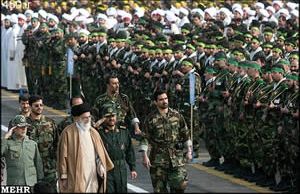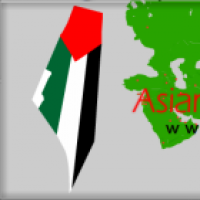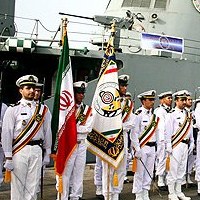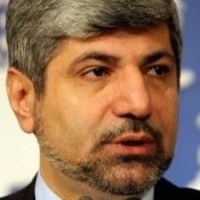![]()
Edited by Dr. Raz Zimmt
Originally published by the Meir Amit Intelligence and Terrorism Information Center, Spotlight on Iran issue, August 8, 2013.
Ever since Rowhani’s victory in the Iranian presidential election, there has been a growing swell of voices in the country calling to restrict the involvement of the armed forces — and particularly the Revolutionary Guards — in the economy.
Majles member Ahmad Tavakoli, considered one of former President Mahmoud Ahmadinejad’s strongest critics in the conservative camp, called on the government last week to make a “resolute decision” on the growing involvement of military and defense officials in the economy. In an interview to the economic daily Tejarat Farda (Commerce of Tomorrow), Tavakoli said that the armed forces have become unfair competition for the private sector, and warned that, unless a decision is made about their economic presence, the military officials will come to wield economic power and even seek to achieve political power.
While there is no easy way to extricate the military officials from the economy, Tavakoli said, their involvement in the economy must be redefined and they should not be allowed to engage in any activity whatsoever in the money market or be contracted to undertake economic projects (rahesabz.net).
Alef, a website affiliated with Tavakoli, took up the criticism as well. A commentary article posted by the website several days after Tavakoli’s remarks referred to the penetration of military officials into the Iranian economy as “the mother of all diseases”. The website discussed the criticism voiced by Tavakoli, as well as reformist candidate Mohammad-Reza Aref’s criticism of the issue at a presidential debate held as part of the last election campaign. According to Alef, such criticism is indicative of the concerns prevalent among the public over the involvement of military officials in the economy.
The author of the article mentioned the political will of Ayatollah Khomeini, the founder of the Islamic revolution, who decreed that all the armed forces, including the army, the Revolutionary Guards, and the Basij, must refrain from any kind of political involvement. According to Alef, that prohibition was intended to prevent the loss of public trust in the army forces and prevent military officials from taking advantage of their military power for political ends. The website argued that the growing involvement of military officials in the economy requires them to drum up political support that will allow them to win economic projects and economic benefits, and to encourage legislation to help them promote their own economic interests.
The intelligence and security infrastructure that the armed forces have at their disposal helps them with their economic activity, and even if military officials do not become involved in politics with the purpose of raising political support for their economic activity, their power and influence turn them into unfair competition for the private sector. As an example of the growing involvement of the armed forces in the economy, the website mentioned that Tose’e-ye E’temad Mobin, a corporation some of whose companies are affiliated with the Revolutionary Guards, won a transaction signed in September 2009, in which 50 percent plus one share of the Telecommunications Company of Iran were offered at the Tehran stock exchange.
Handing over government companies to military officials under the privatization policy is going “from bad to worse”, the article said, and it is cause for political radicalization and economic corruption. The natural result of turning some military elements into large financial businesses is that military officials have become involved in the elections with the goal of bringing about the election of politicians who support their economic activity or preventing those opposed to it from being elected. Alef called on the Majles to take action to stop the penetration of military officials into the economy given its serious consequences. Such activity is the “mother of all political and economic diseases” in Iran and, should it be left untreated, there will be no curing the economic ills facing the country (alef.ir).
Economist Dr. Ali Ghanbari, too, called in recent days for the removal of military officials from the economy, warning that the economic involvement of establishments with ties to military officials may lead to economic chaos. In a press interview, Ghanbari said that the economy should be governed by market mechanisms. Government involvement in the economy is problematic in its own right, but the apparatuses that oversee the government’s work, such as the Majles, can keep that involvement under control. On the other hand, the economic involvement of establishments associated with military officials cannot be monitored, making it a more serious issue than government involvement.
Ghanbari further added that the economic situation stems from the presence of military forces in the economy, and also from the fact that the private sector is unable to play a major role in the market. He noted that in economically better-off countries the government and the defense or military establishments are not as involved in the economy, while the private sector plays a major role in economic activity. Iran should learn from the international experience, reduce to a bare minimum the involvement of military officials and establishments in the economy, and prevent a situation where government companies are handed over to companies and institutions with ties to military officials for the sake of privatization.
The government, Ghanbari said, needs to make a decision and remove the military officials from the economy. Economy is a professional field of activity, and just as the armed forces do not allow outside intervention in military affairs, the government must not let the armed forces intervene in the economy. Ghanbari noted that the intervention of military officials in the economy increased during Ahmadinejad’s presidency since he operated without any economic plan and allowed military officials to intervene in the economy, which led to economic deterioration (tabnak.ir).
Reactions to criticism of the armed forces’ involvement in the economy
As a result of the growing criticism of the armed forces and Revolutionary Guards’ economic involvement, top officials in the defense establishment have recently been obliged to respond to the arguments made with regard to the issue. Seyyed Hassan Firouzabadi, the commander-in-chief of the armed forces, said at a conversation with journalists this week that there is nothing wrong with the armed forces helping the government in the field of economy.
He said that the armed forces began helping the government to rebuild Iran after the devastation of the Iran-Iraq War and to deal with the Western sanctions. The assistance was provided on orders from the Supreme Leader to use the capabilities acquired by the armed forces during the war for the good of the country’s citizens. The armed forces do not initiate any economic program without the government’s request, and they only take part in those projects and tenders in which local contractors do not. Iran’s commander-in-chief noted that it was the assistance extended by the armed forces in various fields that made it possible to achieve significant progress in constructing dams, building factories, and all other economic fields (tabnak.ir).
Ramazan Sharif, the spokesman of the Revolutionary Guards, also recently addressed that organization’s involvement in economic activity. In an interview given to the reformist daily Shargh, Sharif defended the organization’s involvement in national economic projects and argued that the Revolutionary Guards were established to protect the revolution and its achievements in all spheres. He noted that Mohammad-Ali Ja’fari, commander of the Revolutionary Guards, has worked since the beginning of his term to restrict the organization’s involvement in projects that can be completed through local contractors.[1]
A number of media outlets affiliated with the conservative right also came out to support the continued involvement of the armed forces and the Revolutionary Guards in the economy. The Bultan News website recently published an article by Dr. Hassan Rahimi of the University of Bu-Ali Sina in the city of Hamdan, arguing that there is nothing wrong with military officials becoming involved in the economy or being recruited into top executive positions. Rahimi argued that, in his will, the founder of the Islamic revolution had no intention of preventing military officials from taking advantage of their capabilities to realize the objectives of the Islamic revolution, being involved in the economy, or entering into executive positions at times of peace. What is more, since the war waged against Iran by its enemies extends to economy and culture, the presence of the military is needed in those areas as well.
Speaking about the claim that the involvement of military officials in the economy limits the private sector, Rahimi argued that, at any rate, with conditions being what they are, the Iranian private sector has neither the funds nor the ability required for carrying out large-scale projects, such as completing the South Pars gas field. Iran benefited greatly from the armed forces’ technical, engineering, and human capabilities after the Iran-Iraq War, he said, and the country should not be denied of the right to take advantage of those significant capabilities. Rahimi noted that, in other developing countries, the army is also in charge of development projects, and warned that those who challenge the right of military officials to become involved in economic activity send a message to the younger generation that going into the military is not worthwhile, which may compromise Iran’s defense capabilities (bultannews.com).
Are the president and the Revolutionary Guards headed for a confrontation?
The increasing penetration of the Revolutionary Guards into the economy — which has gained momentum owing, among other things, to the effect of the international sanctions — has come under growing criticism from the Iranian political system in the past several years. The criticism was firmly rejected by top Revolutionary Guards officials. For instance, in an interview given to the Khabar Online website in March 2011, Mohammad-Reza Yazdi, the deputy commander of the Revolutionary Guards on legal and parliament affairs, said that the Revolutionary Guards’ economic activity was fully transparent. He argued that it was the governments of Rafsanjani, Khatami, and Ahmadinejad themselves that brought about the involvement of Khatam-ol-Anbiya’, the Revolutionary Guards’ construction corporation, in economic projects in Iran and elsewhere. The economic activity of the Revolutionary Guards, he said, is carried out in compliance with the law, with the approval of the Supreme Leader, and under the full supervision of the Majles, the director of the Supreme Audit Court, and the judiciary’s General Inspection Office (rahesabz).
Even though criticism against the economic involvement of the armed forces — particularly the Revolutionary Guards — is nothing new, it seems that those who criticize that involvement consider Rowhani’s election for president an opportunity to put a limit on it. Rowhani has yet to express any clear stance on the armed forces’ involvement in the economy; however, considering his neo-liberal worldview, which supports reducing government involvement in the economy, he may promote reforms that could hit some of the Revolutionary Guards’ economic interests. Should Rowhani comply with the growing demands to scale down the involvement of the armed forces in the economy, the result could be a conflict between him and the Revolutionary Guards which would require the intervention of Supreme Leader Ali Khamenei.
Note:
[1] For more information, see “Spotlight on Iran — As Rowhani is about to assume the presidency of Iran, the spokesman for the Revolutionary Guards talks about that organization’s interaction with the government”, July 24, 2013.



 RSS
RSS




















[…] [1] For more information, see: “Spotlight on Iran: The Revolutionary Guards’ involvement in the economy comes under increasing criticism following Rowhani’s victory in the presidential election”, August 8, 2013. […]